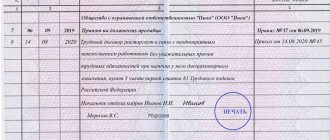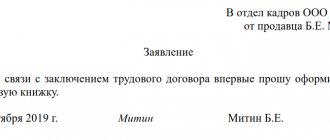If the employer interferes with work...
Litigation regarding compensation to an employee for material damage caused by illegal deprivation of his opportunity to work.
One of the grounds for holding an employer financially liable to an employee is the infliction of material damage to the employee as a result of illegal deprivation of his opportunity to work (Article 234 of the Labor Code). An employer can cause damage if it illegally removes an employee from work, dismisses him or transfers him to another job, fails to reinstate the employee to work if there is such an obligation (established by a court or other authorized body) or fails to issue a properly completed work book in a timely manner.
It should be noted that the mere commission by the employer of the listed illegal actions does not entail the obligation to pay the employee any monetary compensation. A necessary condition for the onset of liability is the inability of the employee to work, which entails material damage for the latter.
The courts have repeatedly considered workers' claims based on the rules contained in Article 234 of the Labor Code. However, as an analysis of judicial practice shows, it happens that the plaintiff abuses his rights established by the Labor Code of the Russian Federation. But, turning to the logic of the legislator, the court may resolve such cases not in favor of the employee.
Compensation should not be paid if the employee was hired for a new job despite violations committed by the employer.
In the case under consideration, the employer was indeed wrong: on his part, there was a violation of the norm of the Labor Code of the Russian Federation on the need to issue the employee a work book on the day of dismissal. However, the lack of a work book did not prevent the plaintiff from getting a new job by presenting a different work book. Thus, having a place of work and receiving wages, the plaintiff tried to obtain compensation for non-existent material damage from his previous employer in court, which he was denied by the court (Determination of the Primorsky Regional Court dated 06/08/2011 in case No. 33-5143).
Almost similar circumstances were considered by the Moscow City Court (Determination dated April 28, 2011 in case No. 33-12989). Unlike the plaintiff in the previous case, in this case the plaintiff, despite not having a work book, managed to get a job in several companies simultaneously by concluding part-time employment contracts. In court, she appealed to the fact that, due to the fault of her previous employer, she was unable to work full-time, and therefore suffered material damage. This claim was denied, since the actions of the defendant, expressed in the delay in issuing the work book, did not entail the deprivation of the plaintiff’s opportunity to work and receive wages.
To bring an employer to financial liability under Article 234 of the Labor Code of the Russian Federation, it is necessary to prove a cause-and-effect relationship between the offense he committed and the material damage to the employee.
The employer fired the employee under a “bad” article - for repeated failure to fulfill job duties without good reason, if he has a disciplinary sanction (clause 5 of part 1 of Article 81 of the Labor Code of the Russian Federation). In court, the entry in the work book about the grounds for dismissal was changed to dismissal at will.
The plaintiff stated that he could not get a job precisely because there was an illegal entry in his work book. However, he could not prove the connection between the entry in the work book and the refusal to hire; in the certificates he provided from failed employers, the reasons for the refusal to hire were listed as completely different. Taking this into account, the court refused to satisfy the plaintiff’s request for payment of compensation for material damage (Determination of the St. Petersburg City Court dated April 4, 2011 No. 33-4687/2011).
An analysis of this court case also allows us to conclude that an employee who has not tried to get another job has an extremely low chance of receiving the above-mentioned compensation from the employer. Responsibility under Article 234 of the Labor Code of the Russian Federation arises only if an employee interferes with the exercise of his right to work (recall that this right is guaranteed by the Constitution of the Russian Federation of 1993), thus, if the employee did not try to exercise his right, he will not have the opportunity to prove that the employer is exercising prevented this right.
An example of such a case is the Determination of the St. Petersburg City Court dated October 4, 2011 No. 33-14974/2011. The claims sought compensation for material damage caused by the delay in issuing the work book due to the fault of the employer. At the initial consideration, the court refused to satisfy this requirement, however, with the above-mentioned Determination, the court noted the need to consider the question of whether the delay in issuing a work book prevented further employment, and whether these unlawful actions of the employer actually caused material damage to the employee. A prerequisite for holding an employer liable is the presence of proven guilt.
The plaintiff (employee) filed a claim with the court to recover lost profits from the employer in the amount of the earnings he did not receive. He did not receive a visa to enter the country in which his place of work was located in accordance with the employment contract in a timely manner, as a result of which he was unable to arrive at his workplace. The work was not completed by him, and accordingly, he was not paid.
According to Article 233 of the Labor Code of the Russian Federation, financial liability of a party to an employment contract occurs for damage caused by it to the other party to this contract as a result of its culpable unlawful behavior (actions or inaction), unless otherwise provided by the Labor Code of the Russian Federation or other federal laws. Consequently, like any other legal liability, financial liability can occur only if certain conditions are met. In accordance with Article 233 of the Labor Code of the Russian Federation, the conditions for the onset of material liability of the parties to an employment contract are the presence of property damage to the injured party; illegality of the action (inaction) that caused the damage; causal connection between the unlawful act and material damage; the fault of the violator of the employment contract. Bringing a party to an employment contract to financial liability is possible only if all the above conditions are present simultaneously, unless otherwise provided by the Labor Code of the Russian Federation or other federal laws.
Thus, the financial liability of the parties to an employment contract is one of the types of legal liability; it consists of the obligation to compensate for real property damage caused to the other party and occurs subject to the presence of grounds and conditions to the extent established in labor legislation.
During the trial, the court found that the visa was not obtained by the employee for reasons beyond the control of the employer, therefore, the defendant was not guilty of causing the plaintiff to lose profits. The employee’s claims were denied (Decision of the Perm Regional Court dated March 16, 2011 in case No. 33-2321).
Compensation for material damage caused by late issuance of a work book will be payment for forced absenteeism, and not compensation for lost profits due to failed employment.
This question is fundamental when calculating the amount to be paid to an employee whose rights have been violated. Thus, lost profits would be calculated based on the amount of wages that the employee could have received upon starting work for a new employer. But labor legislation does not provide an employee with the opportunity to appeal to the employer to claim compensation for lost profits. At the same time, there is a certain rule that prescribes that a delay in issuing a work book should be considered forced absenteeism - this follows from the meaning of paragraph 4 of clause 35 of the Rules for maintaining and storing work books, producing work book forms and providing them to employers (approved by Decree of the Government of the Russian Federation of April 16, 2003 No. 225). According to this norm, if the employer delays issuing the work book due to termination of the employment contract, the day of dismissal should be considered the actual day of issue of the work book. Thus, the time from the moment of dismissal (when the work book was not issued) until the moment the work book is issued is forced absenteeism (since the employee is considered not to have been dismissed in the initial period, but he did not work).
In support of these conclusions, one can cite a case considered by the Perm Regional Court. Satisfying the claims of V-voy and collecting money from LLC “N” in its favor, the magistrate came to the conclusion that the plaintiff suffered material damage in the form of earnings she did not receive in connection with the illegal deprivation of the opportunity to work caused by the delay in issuing work book. At the same time, in collecting damages in favor of the plaintiff, the court proceeded from the wages that she could have received from the individual entrepreneur K-va, who refused to hire the plaintiff due to her lack of a work book. When reviewing this case in the cassation instance, the court came to the conclusion that the initially collected amounts, in essence, are lost profits, which cannot be recovered in accordance with the norms of the Labor Code of the Russian Federation and within the framework of the labor relations between LLC “N” and the plaintiff.
As a generalization of the above examples of court decisions, we can conclude that labor legislation provides employees with a fairly wide range of rights and guarantees, protecting their interests even to a greater extent than the interests of employers. However, a literal interpretation and application of certain labor law norms is impossible without taking into account other norms established by law. If the plaintiff appeals to one norm while ignoring the others, he may not take into account the logic that guided the legislator in establishing these norms. This problem is usually solved by the court, taking into account both the norms on which the plaintiff’s claims are based and other provisions of legal acts. Only such a comprehensive consideration of the case can contribute to the adoption of the only correct decision by the court.
Resolution No. 44-g-917 dated July 27, 2007, Review of the cassation and supervisory practice of the Perm Regional Court in civil cases for 2007 (prepared by the Perm Regional Court on February 7, 2008).
What to do if an employer refuses to hire you for a job
2.1. Persons under 16 years of age, with the exception of:
1) students aged 15 years - to perform light work that does not harm their health, in their free time from receiving basic general education and without prejudice to the development of the educational program;
2) persons aged 15 years who have received basic general education or left an educational organization early - to perform light labor that does not harm their health;
3) students aged 14 years - to perform light labor in their free time from school that does not harm their health and does not disrupt the learning process, with the written consent of one of the parents (guardian) and the guardianship authority. If the other parent disagrees with the conclusion of the employment contract, it is necessary to take into account the opinion of the minor himself and the guardianship and trusteeship authority;
4) persons under the age of 14 years - to work in cinematography organizations, theaters, theatrical and concert organizations, circuses, if such work does not cause damage to his health and moral development, with the written consent of one of the parents (guardian) and the guardianship authority ;
5) athletes under the age of 14 years - with the written consent of one of the parents (guardian) and permission of the guardianship and trusteeship authority, issued on the basis of a preliminary medical examination.
2.2. Persons under 18 years of age cannot be hired for jobs that:
1) performed on a part-time basis;
2) carried out on a rotational basis;
3) provided by a religious organization;
4) is associated with harmful and (or) dangerous working conditions;
5) performed underground;
6) may be harmful to health and moral development (gambling business, work in night cabarets and clubs, production, transportation and trade in alcoholic beverages, tobacco products, narcotic and other toxic drugs, erotic materials);
7) is associated with carrying and moving heavy loads that exceed the established limits. An exception is cases of participation of athletes under the age of 18 years in sports events in which it is allowed to exceed the maximum load limits if this is necessary in accordance with the preparation plan for competitions and such loads are not prohibited for health reasons, as confirmed by a medical report;
 associated with narcotic drugs and psychotropic substances;
associated with narcotic drugs and psychotropic substances;
9) involves inclusion in the departmental security;
10) is associated with the conclusion of a written agreement on full financial liability.
2.3. Persons under 20 years of age are not allowed to work with toxic chemicals, which are classified as chemical weapons.
2.4. Persons over 70 years of age cannot be hired:
1) for the position of heads, deputy heads of state and municipal educational organizations of higher education;
2) the head of a branch of state and municipal educational organizations of higher education.
3) head, deputy head of a state or municipal scientific organization.
2.5. Women applying for jobs:
1) associated with lifting and manually moving weights exceeding the maximum permissible standards. The exception is cases of participation of female athletes in sports events in which it is allowed to exceed the maximum load limits if this is necessary in accordance with the preparation plan for competitions and such loads are not prohibited for health reasons, as confirmed by a medical report;
2) associated with harmful and (or) dangerous working conditions, including underground work (except for non-physical work or work on sanitary and consumer services).
2.6. Persons applying for part-time work in the following cases:
1) for work related (like his main activity) to driving vehicles or controlling the movement of vehicles;
2) to work as a coach or athlete in the absence of permission from the employer at the main place of work;
3) to work as the head of an organization in the absence of permission from the authorized body or the owner of the organization (or a person or body authorized by him) at the main place of work of the manager;
4) to work under harmful and (or) dangerous working conditions, if the main work involves the same conditions.
2.7. Pregnant women and women with children under 3 years of age cannot be hired on a rotational basis.
2.8. Persons who have not passed the mandatory medical examination upon employment:
1) in the organization of the food industry, public catering, trade, medical and preventive care and children's institutions, etc.;
2) with difficult, harmful and (or) dangerous working conditions;
3) related to traffic;
4) carried out in the regions of the Far North and equivalent areas;
5) related to the provision of mental health care (as medical workers and other personnel).
Persons under 18 years of age cannot be hired without undergoing a mandatory medical examination.
2.9. Disqualified workers cannot be hired:
1) as the head of an organization;
2) as a coach, sports medicine specialist, etc.;
3) for positions of medical or pharmaceutical personnel.
2.10. Persons disqualified from holding certain positions cannot be accepted:
1) to work in local government bodies (local administration);
2) to work in a position that they are prohibited from holding, or related to activities that they are prohibited from carrying out.
2.11. Persons who have or have had a criminal record and have been subject to criminal prosecution (with the exception of persons against whom criminal prosecution was terminated on rehabilitative grounds) for crimes against life and health, freedom, honor and dignity of the individual (with the exception of illegal hospitalization in a medical organization providing psychiatric care in stationary conditions, and slander), sexual integrity and sexual freedom of the individual, against family and minors, public health and public morality, the foundations of the constitutional order and state security, peace and security of mankind, as well as against public safety, cannot carry out:
1) teaching activities;
2) activities in the following areas:
— education, upbringing, development of minors;
— organization of recreation and health improvement for minors;
— medical care, social protection and social services for minors;
— children's and youth sports, culture and art with the participation of minors.
These persons have a criminal record for committing crimes of minor gravity and crimes of moderate gravity against life and health, freedom, honor and dignity of the individual (with the exception of illegal hospitalization in a medical organization providing psychiatric care in an inpatient setting, and slander), family and minors, health population and public morality, the foundations of the constitutional system and the security of the state, the peace and security of mankind, as well as against public safety, and persons against whom criminal prosecution on charges of committing these crimes have been terminated on non-rehabilitative grounds cannot be allowed to engage in teaching activities in in the absence of a decision from the commission on affairs of minors and protection of their rights, created by the highest executive body of state power of a constituent entity of the Russian Federation, on their admission to teaching activities.
2.12. Persons with an unexpunged or outstanding criminal record cannot be accepted:
1) to work in departmental security.
Persons who have an unexpunged or outstanding conviction for committing intentional crimes cannot be accepted:
1) for positions of aviation personnel specialists;
2) to aviation security services;
3) for any work directly related to ensuring transport security.
2.13. Foreign citizens cannot be accepted:
1) for positions as part of the crew of a ship sailing under the State flag of the Russian Federation;
2) to work as a crew member of a Russian warship or other vessel operated for non-commercial purposes, as well as an aircraft of state or experimental aviation;
3) for positions as part of the flight crew of a civil aircraft of the Russian Federation (commander, other flight personnel);
4) to work in organizations that include radiation hazardous and nuclear hazardous production facilities and facilities related to nuclear weapons;
5) to work in structural divisions of organizations whose activities are related to nuclear installations, radioactive waste, radiation sources and ensuring their safety;
6) to work on ships and other watercraft with nuclear installations, at nuclear power plants, including those under construction (except for cases of admission of foreign citizens to work at a nuclear power plant in agreement with the FSB of Russia);
7) until they reach 18 years of age (except for athletes and persons employed in cinematography organizations, theaters, theatrical and concert organizations, circuses).
If you do not fall into the category of persons to whom the employer has the right to refuse employment, proceed to step 3.









